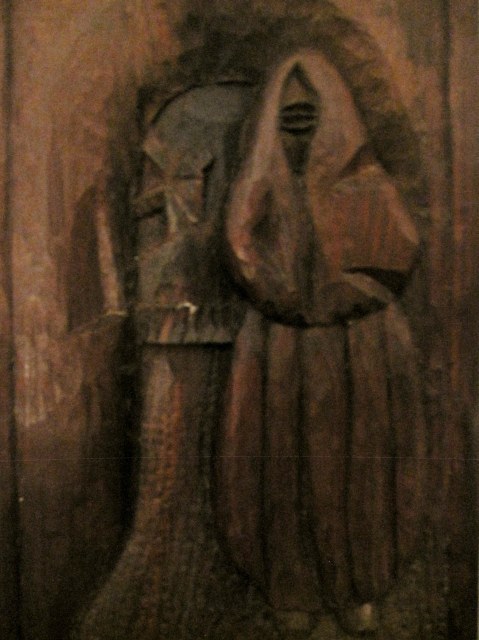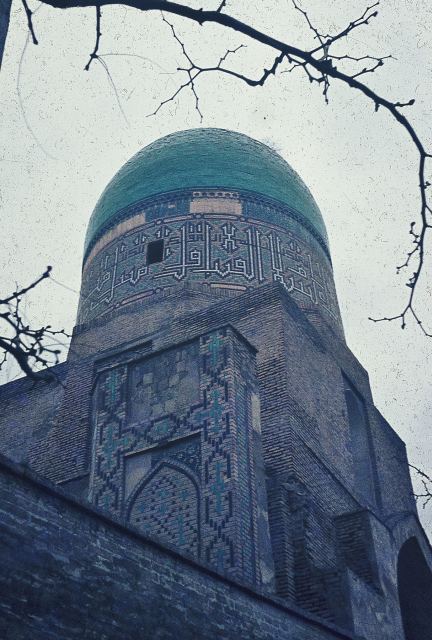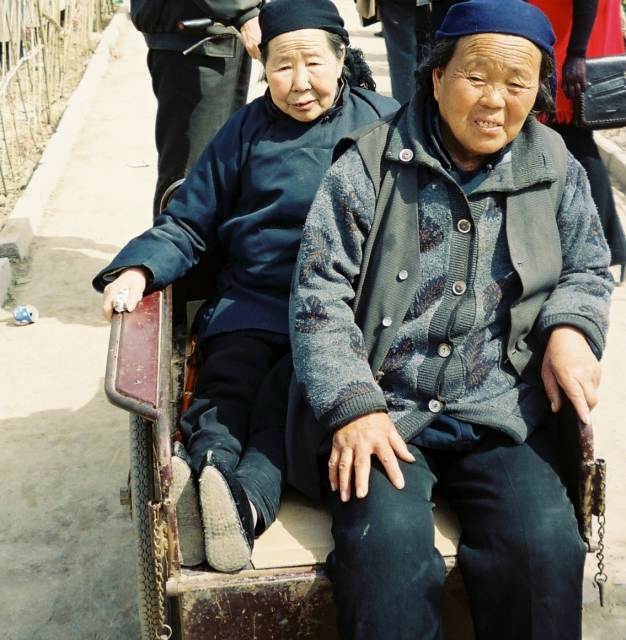 An hour into the conversation, I am trying to figure out my way through it. It doesn’t feel like a dance… nor a series of volleys passed back and forth over an invisible net. It is definitely toe-to-toe. Nadia cuts me no quarter… her green, gray eyes intense… her speech, passionate… and I am a little worried about how things will end up.
An hour into the conversation, I am trying to figure out my way through it. It doesn’t feel like a dance… nor a series of volleys passed back and forth over an invisible net. It is definitely toe-to-toe. Nadia cuts me no quarter… her green, gray eyes intense… her speech, passionate… and I am a little worried about how things will end up.
We’ve been talking for a long while around the table. It’s Orthodox Easter and the Russians have invited me for Sunday lunch. We are cramped in Raia’s small apartment. Tables are pushed together. Chipped dishes and dissimilar glasses sit on the mismatched tablecloths. Silverware is missing. But, the food is memorable Russian fare… the character of the people sitting around the table in no need of tableware finery to enhance an impression of them.
We sample a traditional course of “zakuska”… various appetizer dishes… potato salad with peas… pickled cabbage… bread. Russian music plays in the background. Vadya is sitting next to me attentive and funny, and I am in stitches the entire time. Suddenly the Russian anthem begins to play. He bolts from his chair in mid-sentence, runs to the CD player, turns up the music, raises his fist to the sky, and bellows, “Stalin.” We all smile. Vadya is being Vadya, but behind his antics that may be sincere, there is a thorny story ready to be heard. All the signs are there that he will tell it. It is only left to eat together… to wait.
Raia has made “cutleta.” Nadia… roast chicken. Vadya describes how he has searched for old potatoes to add flavor to the mashed potatoes and has used butter he brought from Russia. We all laugh about the suitcases of food we bring from home to save for occasions such as these… drink the Chinese wine that is “slatka”… far too sweet. We make turned down faces each time we try to drink it. The drinking of bad wine brings us together in a way that our cultures cannot.
… and, then, between main course and desert, the story rushes out sideways, but woven… like water through rapids. It begins with Vadya talking about his longing for his old life in Tashkent… how he spent most of his life there. Suddenly, all of Uzbekistan wraps the magic of its arms around us  while Yura’s eyes take on that recognizable Uzbek light as he speaks. There is a collective “ahhhhhh” at the table. We all understand… Uzbekistan… that ancient heart of a place that beats dust… it’s cadence of ancient wooden doors from the street… alleys… bazaars and turquoise tiles… towering madrasas and minarets… legends of Tamerlane and Ulugbek… the memories softly sensual like its intricate, gold embroidery on handmade velvet.
while Yura’s eyes take on that recognizable Uzbek light as he speaks. There is a collective “ahhhhhh” at the table. We all understand… Uzbekistan… that ancient heart of a place that beats dust… it’s cadence of ancient wooden doors from the street… alleys… bazaars and turquoise tiles… towering madrasas and minarets… legends of Tamerlane and Ulugbek… the memories softly sensual like its intricate, gold embroidery on handmade velvet.
Vadya talks on lost in composition… a picture he is painting of himself for us. He has started at the edges with details but has not gotten to the theme that will pull it all together.
Then, another detail. Vadya takes out the medal he wears around his neck. It is of Genghis Khan. Unlike the West’s version of the Mongol hoards, his understanding is informed and deep… his attitude seems reverent about this Temujin suspended between questionable truths and wild fictions….blood thirstiness and, yet, relgious tolerance. He waves the medal towards me as if his own fate is tied in some way to that of the conqueror. I am beginning to think that, perhaps, it is. I am left to imagine just how.
 I remember Vadya’s exhibition from two years ago… how there were so many paintings of Uzbek streets… the Registan… Emir Guri… antiquity. I get up the nerve to ask him why he left Uzbekistan knowing the answer I will get. “We had to leave,” he says. “We were Russians.”
I remember Vadya’s exhibition from two years ago… how there were so many paintings of Uzbek streets… the Registan… Emir Guri… antiquity. I get up the nerve to ask him why he left Uzbekistan knowing the answer I will get. “We had to leave,” he says. “We were Russians.”
The Soviet Union had fallen to pieces. He must have had to abandon everything… his work… the house he lived in… his friends… the tapestry Uzbek life interwoven like Turkic and Persian fairytales. He left the only life he had ever known… a Russian living in Uzbekistan.
He settled in the new Russia fifteen years ago. “It’s nice… it’s beautiful,” he says, “but… well, I would leave there but that my wife and daughter are still there.”
That is how he comes to be sitting at this table with three from the same town. His mourning is like the waterfall after the rapids… no danger now… only the tumbling waters into the river that has continued to flow regardless. He has complete awareness of what can happen in this life… what can be taken away without hope of a return. We sit there in silence for a moment picking at the chocolate torte with strawberry jam from the Japanese bakery.
They are all in front of me… five people so changed by politics that they don’t even recognize their own lives by now. I am considering that if I were an Uzbek, I might be thinking differently about him… and I can’t get out of my mind the horrible stories told to me about Russians by my Romanian relatives… but this is Raia, Kostya, Tania, Vadya, Elena and Nadia. I am at Raia’s table with them… and all I can see are five people with little money and few prospects except a dispossessed life teaching painting, Russian and gymnastics in China. Yet, they have made the best of it all… laugh often with that gift of dark humor so characteristic of Russians… paint their pictures… teach their students… kiss their icons and make the sign of the cross before sleep… dream. I think that they may still have dreams.
~~~
It’s two weeks after Easter. It’s a Sunday morning and I am skimming the paper over articles about the usual cataclysmic results of wars… the surfeit of racial and religious hatred. I am thinking back on my conversation with Nadia on Easter as I read the article. She is like an overheated motor… it’s old parts clanking along at such an alarming speed that Elena and Tania are beginning to straighten their backs… their faces frozen in discomfort. Raia zones out into sleep and Vadya pleads a headache and leaves the table for a while. Nadia is furious about Tibet and asks me why the Americans support the Dalai Lama. I remind her that it is not just the Americans who support the Tibetan government in Dharamsala and its cause. She does not miss a step as she revises and includes “everyone else.” She says that the issue of Tibet is just like the issue of the crumbling of the Soviet Union into chunks of separate countries. What of sacred homelands? What of history? These are things the West has lumbered into clumsily with not one whit of understanding, she says…and what of families?
Nadia is from Moscow, but her sisters are now in different countries… one in the Ukraine and one in Byelorussia. She rails about the poverty of her sister’s life in Byelorussia and holds the president personally responsible for the stupidity of its course. It is as if life can throw anything at her, and she will take it… but her sisters. Why them? Why must they suffer?
The rest chime in. There is no room in the new cemetery in their town, because so many have died. There is little health care… the infrastructure crippled… nuclear waste buried in the oddest of places. Life as they remembered has become a distant glimmer in this new configuration of democracy… a memory that is slipping away.
I ask Kostya and Tania what they think about what Nadia has to say. Kosta replies, “It is a pointless conversation. What can any of us at this table do about any of these things?”
“But,” I reply, “It is important to say these things… perhaps to talk about them with people not your own… to hear and understand these things.” There is a sigh of relief and an easing of tension that I have not been offended. After all, I am a guest… and no guest should ever be offended at a Russian table.
I am still haunted by Nadia’s last questions, however. “What is freedom?” she asks. “What is democracy? I cannot go where I want. I cannot do what I want. I cannot go live in the United States. I cannot even live in China.” Her voice cracks with these last two sentences, but there are no tears in her eyes. Tears are a luxury in a life without luxury. Besides, she is too tough for that. I am left wondering. Is she able to go see her sisters? It is a question I don’t ask out of respect.
~~~
I miss no holidays at all except Easter. From the moment I’ve offered the traditional Russian greeting: “Xristos voskres” and receive the reply “Vo’istinu vosrkes,” I am taken back to my childhood Easter mornings greeting each other the same way in the Romanian language, “Christ is risen.” “Truly he is risen.”
 I miss ironed linen on the table… round glass plates piled high with the thin, crisp “cookies of heaven”… lighted candles in crystal candelabra… loaves of poppy seed and walnut… eggs colored in onion skins that wait for breaking them to see which will withstand our silly Easter efforts to find an egg that is hard and will withstand a crack… a house filled with people after church on Good Friday… cold ham… the smell of hyacinths and soft spring air from the open windows… every light on in the house.
I miss ironed linen on the table… round glass plates piled high with the thin, crisp “cookies of heaven”… lighted candles in crystal candelabra… loaves of poppy seed and walnut… eggs colored in onion skins that wait for breaking them to see which will withstand our silly Easter efforts to find an egg that is hard and will withstand a crack… a house filled with people after church on Good Friday… cold ham… the smell of hyacinths and soft spring air from the open windows… every light on in the house.
The Russians have a basket of colored eggs and I crack eggs with them as we laugh. If the custom is true, I will see them all in the next life by enjoying this ritual. Raia is the winner. I feel at home here in this tiny home away from home… this place that has taken me in.
My mother baked and baked for Easter… the more to give away. As the loaves came out of the oven my mother would say in Romanian, “Let the fragrance go to God first.” My mother was fond of saying that her children stood there for those minutes lost in thoughts between God and cake before she would cut a warm loaf smelling sweetly of bread for us to eat… and my thoughts are somehow entwined with this phrase of my mother’s as I sit there with the Russians. What has come of the lives of these friends seems to arise with their voices into the thin air toward heaven…  the life that comes of accepting the enormity of what is lost and still continuing on… the pause at the realization of only what joy can still remain as they cross themselves in front of their icons before they go to bed. The powerful distillation formed in this crucible has surely ascended… a small resurrection… to God first before anything else. Does God hear them out? Does God really know their every need?
the life that comes of accepting the enormity of what is lost and still continuing on… the pause at the realization of only what joy can still remain as they cross themselves in front of their icons before they go to bed. The powerful distillation formed in this crucible has surely ascended… a small resurrection… to God first before anything else. Does God hear them out? Does God really know their every need?
Perhaps they might say that God does.
After all, in a world that is brutal in its increasing waywardness… on this planet where nature has been left no choice but to retaliate against us… a place where media reminds us at each ticking moment how bad things really are, what is there to hold on to except a mysterious force that explains life’s complications, maybe even a Genghis Khan, when everything loved has been taken away and even when it has not?
~~~
I see an old Chinese woman on the way home from Easter lunch. She has a shock of thick, straight, gray hair. She is wearing a blue jacket of boiled wool and is walking oddly with a cane. I look down to her black cloth shoes. Her feet had been bound… tiny, mangled feet that have carried her through more than her share of woes… a survivor of a mountain of hard times.
My father once told me a story about myself. He said that I had pulled myself up early and walked two weeks before my ninth month. He still had a proud glint in his eye after all of those years and said, chuckling, “You just got up and walked off.”
I have been walking off ever since. I’ve gone where I wanted to go when I wanted. My feet had always been free not to be bound.

